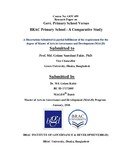| dc.contributor.advisor | Fakir, Dr. Md. Golam Samdani | |
| dc.contributor.author | Kabir, Dr. Md. Golam | |
| dc.date.accessioned | 2018-06-03T03:58:04Z | |
| dc.date.available | 2018-06-03T03:58:04Z | |
| dc.date.copyright | 2018 | |
| dc.date.issued | 2018-01 | |
| dc.identifier.other | ID 17172005 | |
| dc.identifier.uri | http://hdl.handle.net/10361/10232 | |
| dc.description | This dissertation is submitted in partial fulfillment of the requirements for the degree of Masters in Procurement and Supply Management, 2018. | en_US |
| dc.description | Cataloged from PDF version of dissertation. | |
| dc.description | Includes bibliographical references (page 89-93). | |
| dc.description.abstract | This study deals with the status of quality education in Govt. and Brac primary schools in Bangladesh. Along with an examination of education policy of Bangladesh, it is an attempt to get knowledge of quality education implementation in classroom. This study is done in a qualitative way following purposive sampling. Two schools are considered as cases for the study. As such, observation, interviews and document analysis are used for data collection. Different stakeholders like students, teachers and education officials participated in the interviews. The quality education framework of the Global Monitoring Report (GMR) 2005 was considered as an analytical framework for the study. The framework was applied to discuss the findings of study in tandem with literature review. Both teachers and students were thought to play important roles to ensure quality during the teaching and learning process in classrooms. Although teachers seem key actors but quality education is hardly practiced by Govt. teachers considering the quality parameters in education policy whereas teachers of BRAC schools try hard to ensure quality in spite of facing many challenges.
The research seems to indicate that both schools have inadequate teaching-learning materials. In addition, teachers of Govt. schools still follow some forms of traditional methods which give students less opportunity for classroom interaction. Conversely, innovative strategies in BRAC schools appear cooperative and participatory. Although learners of BRAC School come from poor families and get physically less privileges, they receive good treatment from schools compared to Govt. schools where the students have better physical opportunities. Moreover, findings from the study indicate that Govt. schools seem less concerned to maintain quality at different stages of teaching and learning inside classrooms although it has good physical opportunity. BRAC field officials and teachers receive various kind of trainings related to governance and academic subjects of different grades and some special training to maintain teaching and education quality. Almost all group of respondents say that BRAC primary school has positive impact on their society compare to Govt primary school. In corast, BRAC schools appear to maintain quality inside classrooms having less physical facilities. Summing up, in spite of having outside classroom advantages in Govt. school, it seems that there is relatively better quality teaching-learning in BRAC School. | en_US |
| dc.format.extent | 104 pages | |
| dc.language.iso | en | en_US |
| dc.publisher | BRAC Univeristy | en_US |
| dc.rights | BRAC University dissertations are protected by copyright. They may be viewed from this source for any purpose, but reproduction or distribution in any format is prohibited without written permission. | |
| dc.subject | Primary school | en_US |
| dc.subject | Primary education | en_US |
| dc.subject | BRAC education | en_US |
| dc.title | Govt. primary school versus BRAC primary school : a comparative study | en_US |
| dc.type | Dissertation | en_US |
| dc.contributor.department | BRAC Institute of Governance and Development, BRAC University | |
| dc.description.degree | M. Procurement and Supply Management | |

